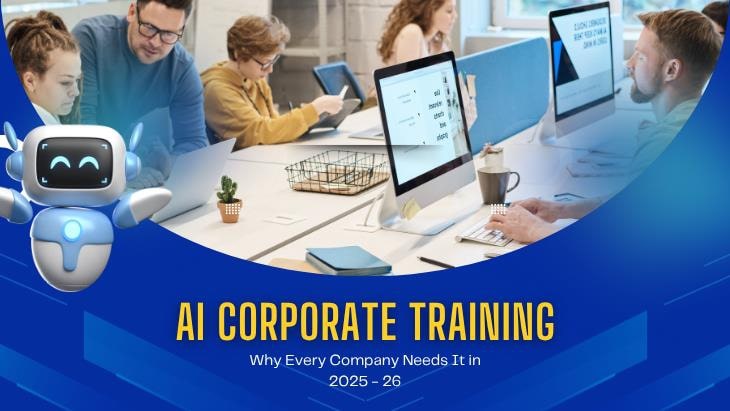By 2025, upskilling will be a strategic need rather than only a competitive advantage. Rapid developments in cybersecurity, cloud computing, artificial intelligence, and automation mean businesses must prepare their teams for the expectations of tomorrow.
Companies who make investments in thorough software training will be positioned to lead in operational efficiency, productivity, and creativity as we travel through 2025. Here are the top 10 software training courses to upskill your staff this year regardless of your objectives—digital transformation, improved data use, or simplified development.
Top Software Training Programs to Upskill Your Workforce
1. Artificial Intelligence and Machine Learning
From automating customer interactions to allowing sophisticated data analysis, artificial intelligence and machine learning are rewriting how companies run. By means of training in this domain, staff members can develop models supporting intelligent automation, pattern recognition, and decision-making.
Skills Gained:
- Feature engineering and data cleaning
- Learning algorithms, both supervised and unsupervised
- Deep learning derived from neural networks
- Computer vision and natural language processing
- Ethics in artificial intelligence
Perfect for data analysts, software programmers, teams in business intelligence, and leaders of innovation.
2. Cloud Computing (AWS, Azure, GCP, etc.,)
The foundation of contemporary IT architecture is cloud platforms. By enabling teams to design, implement, and manage scalable, secure systems—so lowering costs and boosting agility—training in cloud technologies helps teams.
Skills Gained:
- Cloud building and deployment strategies
- Storage, virtualisation, serverless computing,
- Management of identity and access
- Best standards for cloud security
- Cloud-native migration and application development
Perfect for infrastructure managers, system administrators, software programmers, and IT experts.
3. Cybersecurity and Risk Management
Cybersecurity skills are essential given rising risks and compliance needs. Training in this area improves your team's capacity to spot weaknesses, protect digital assets, and react fast and forcefully to events.
Improved Skills:
- Security at networks and terminals
- Penetration tests and vulnerability evaluations
- Threat intelligence and observation
- Digital forensic techniques and incident response
- Risk studies and compliance systems
Perfect for: auditors, system managers, IT security experts, and compliance teams.
4. Business Intelligence and Data Analyst
Though organisations create enormous amounts of data, actual value comes from turning that data into insightful analysis. Training in analytics helps teams to use data for improved decision-making, cleaning, interpreting, visualising, and leveraging tools.
Skills Learnt:
- Transformation and data wrangling
- Data modelling and statistical study
- Creating dynamic dashboards
- For analytics, SQL, Python, or Excel.
- Executive reporting: data storytelling
Perfect for analysts, marketing teams, product managers, and strategic decision-makers.
5. Web Development
Engineers can manage client-side as well as server-side programming with full-stack development. By means of training in this domain, teams can create scalable, secure, responsive web applications.
Skills Developed:
- Front-end architectures including HTML, CSS, JavaScript, and React
- Node.js, databases, and RESTful APIs—back-end technologies—e.g.,
- Techniques for authorisation and authentication
- Version control and implementation systems
- Responsive design and performance optimisation
Perfect for: startups, freelancers, web developers, and product teams.
6: DevOps and Agile Methodologies
DevOps enhances cooperation between development and operations and speeds software delivery. Agile approaches boost constant improvement and provide more freedom. For contemporary software teams, they are indispensable taken together.
Skills Developed:
- CI/CD, or continuous integration/continuous deployment
- Infrastructure as Code, IaC
- Tools for monitoring and automating
- Agile models, including Scrum and Kanban
- Iterative work and sprint planning
Perfect for project managers, software developers, QA teams, and DevOps engineers.
7. Low-Code/No-Code Development
Low-code and no-code systems are allowing non-technical employees to create apps and process automation without creating significant code. This strategy lowers IT backlog and speeds innovation.
Acquired skills:
- Design of UI and visual apps
- Automation of processes and flows
- Combining systems and outside tools
- Configuration of logic and triggers
- User role management and access
Perfect For: operations teams, startups, business analysts, and citizen developers.
8. Robotic Process Automation (RPA)
RPA systems improve process accuracy, simplify repetitive tasks, and free staff time for higher-value projects. RPA training increases operational effectiveness in HR, finance, and customer service, among other areas.
Acquired skills:
- Building bots to automate rules-based chores
- Designing triggers and flow
- RPA in conjunction with current systems
- Tracking and preserving digital employees
- Calculating ROI and streamlining procedures
Perfect for operations teams, HR departments, financial experts, and managers of digital transformations.
9. Mobile App Development
Development of Mobile Apps Users and customers now expect mobile-first experiences. Mobile development training enables teams to produce responsive, easy-to-use iOS and Android apps.
Skills Developed:
- Native mobile development languages (Java, Kotlin, Swift)
- React Native's cross-platform framework (Flutter)
- UX/UI design for mobile interfaces
- Backward integration and mobile APIs
- Application testing, deployment, and maintenance
Perfect for mobile designers, teams of designers, and product owners.
10. ERP and CRM Systems Training
Systems for customer relationship management (CRM) and enterprise resource planning (ERP) are absolutely vital for companies. Training guarantees staff members can use these tools to manage resources, simplify processes, and interact with customers.
Skills Developed:
- Customising and configuring ERP/CRM systems
- Automating company procedures
- Reporting within platforms and data analysis
- Data security and user roles
- Forecasts of sales, inventory control, and resource planning
Perfect for supply chain managers, CRM managers, finance teams, and salespeople.
Conclusion
Keeping ahead in business in 2025 means keeping ahead in skills. Through software training, upskill not only improves team performance but also job satisfaction, lowers turnover, and improves the organisation's changeability.
Rather than a one-size-fits-all solution, companies should evaluate present skill gaps, match training goals with strategic objectives, and apply learning paths that produce quantifiable corporate results.
Ready to Upskill Your Team?
Explore customized training programs with Techaedu and empower your workforce to meet the demands of tomorrow, today.





Leave a reply